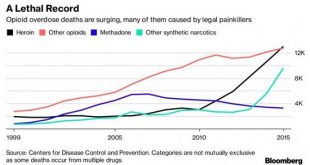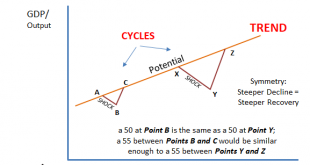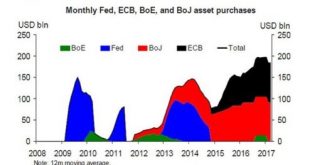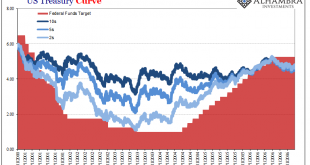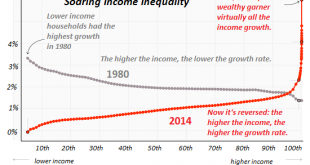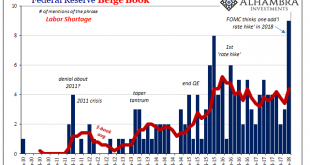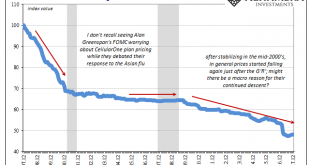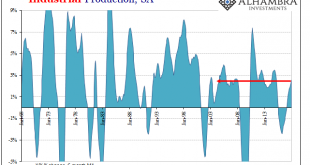One of the major rivalries in the US is that between California and Texas, the country’s biggest and second-biggest states respectively in GDP terms. They have different growth drivers (most notably Silicon Valley in California and the energy industry in Texas), and they also have different political landscapes – and local taxation regimes. But which one’s ahead when it comes to employment growth? The two states were...
Read More »Can We Finally Have an Honest Discussion about the Opioid Crisis?
The economy no longer generates secure, purposeful jobs for the working class, and so millions of people live in a state of insecure despair. The opioid epidemic is generating a lot of media coverage and hand-wringing, but few if any solutions, and this is predictable: if you don’t face up to the causes, then you can’t solve the problem. America is steadfastly avoiding looking at the causes of the opioid crisis, which...
Read More »The Dismal Boom
There is a fundamental assumption behind any purchasing manager index, or PMI. These are often but not always normalized to the number 50. That’s done simply for comparison purposes and the ease of understanding in the general public. That level at least in the literature and in theory is supposed to easily and clearly define the difference between growth and contraction. But is every 50 the same? That’s ultimately at...
Read More »Central Banks: From Coordination to Competition
This is one reason why I anticipate “unexpected” disruptions in the global economy in 2018. The mere mention of “central banks” will likely turn off many readers who understandably have little interest in convoluted policies and arcane mumbo-jumbo, but bear with me for a few paragraphs while I make the case for something to happen in 2018 that will impact us all to some degree. That something is the decay of the...
Read More »What About 2.62percent?
There’s nothing especially special about 2.62%. It’s a level pretty much like any other, given significance by only one phrase: the highest since 2014. It sounds impressive, which is the point. But that only lasts until you remember the same thing was said not all that long ago. Back last March, the 10-year yield had then, like now, broke above 2.60%. In doing so, it surpassed the previous recent high set in December...
Read More »It’s Time to Retire “Capitalism”
Our current socio-economic system is nothing but the application of force on the many to enforce the skims, scams and privileges of the self-serving few. I’ve placed the word capitalism in quotation marks to reflect the reality that this word now covers a wide spectrum of economic activities, very little of which is actually capitalism as classically defined. As I have explained here for over a decade, the U.S. economy...
Read More »U.S. Unemployment: The Dissonance Book
I’ve found the word “dissonance” has become more common in regular usage beyond just my own. Whether that’s a function of my limited observational capacities or something more meaningful than personal bias isn’t at all clear. Still, the word does seem to fit in economic terms more and more as we carry on uncorrected by meaningful context. The Buffalo News reported this week the results of M&T Bank’s survey of...
Read More »Good or Bad, But Surely Not Transitory
When Federal Reserve officials first started last year to mention wireless network data plans as a possible explanation for a fifth year of “transitory” factors holding back consumer price inflation, it seemed a bit transparent. One of the reasons for immediately doubting their sincerity was the history of that particular piece of the CPI (or PCE Deflator). To begin with, the unlimited data plan wars that kicked off...
Read More »Is Un-Humming A Word? It Might Need To Become One
Industrial Production in the US was up 3.6% year-over-year in December 2017. That’s the best for American industry since November 2014 when annual IP growth was 3.7%. That’s ultimately the problem, though, given all that has happened this year. In other words, despite a clear boost the past few months from storm effects, as well as huge contributions from the mining (crude oil) sector, American production at its best...
Read More »Nous sommes colonisés par le numérique des multinationales américaines
La révolution numérique est une réalité qui envahit tous les jours plus les sphères publiques et privées…. Qu’en est-il du commerce de détails? Les visuels ci-dessous nous montrent d’abord que certaines habitudes d’achats dans les commerces traditionnels sont maintenues. C’est d’autant plus vrai que cette présentation, que nous offre Bloomberg, n’inclut pas les achats de voitures et de nourriture. Il est donc probable...
Read More » Swiss Economicblogs.org
Swiss Economicblogs.org


